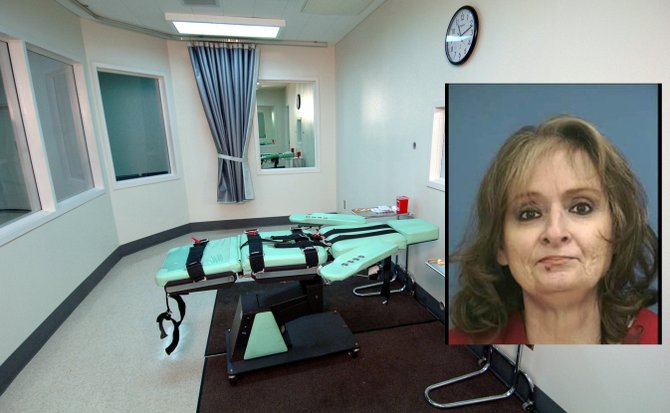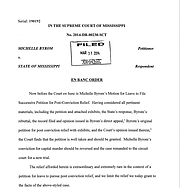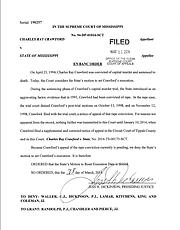The death sentences of Michelle Byrom (pictured) and Charles Crawford have put Mississippi in the midst of the controversy over what constitutes “cruel and unusual” in executions.
An Innocent Woman? Michelle Byrom vs. Mississippi
Read Ronni Mott's March 19, 2014, story in the JFP that brought international attention to the tragic case of Michelle Byrom.
JACKSON — This afternoon, the Mississippi Supreme Court did something it rarely does: reverse the conviction of a death-row inmate.
The news followed an intense 13 days of media attention since Jackson Free Press writer Ronni Mott published an article on March 19 detailing the many problems with the conviction of the abused Tishomingo County woman for paying a third person to kill her husband, Edward Byrom Sr., in 1999. Much of the evidence never got to the jury, including from several confession letters written by Byrom's son, Edward Jr., saying that he killed his father.
Byrom, 56, had been on death row, and at one point faced a possible execution date of March 27, a date Attorney General Jim Hood had requested.
In addition, a newspaper in north Mississippi reported that the prosecutor said that the hitman Byrom supposedly paid did not actually kill her husband.
Writing on behalf of the court in a two-page en banc order, Josiah Dennis Coleman granted her Motion for Leave to File Successive Petition for Post-Conviction relief. "Michelle Byrom's conviction for capital murder should be reversed and the case remanded to the circuit court for a new trial." Coleman made a point of saying that Circuit Court Judge Thomas J. Gardner, who presided over Byrom's first trial in November 2000, could not oversee her new trial.
Coleman also acknowledged that this order is unusual for the court. "The relief afforded herein is extraordinary and extremely rare in the context of a petition for leave to pursue post conviction relief, and we limit the relief we today grant to the facts of the above-styled case," he wrote.
Tom Freeland, an Oxford lawyer who blogs at NMissCommentor, wrote today that the reversal of the conviction is very unusual: "This is after the case has been tried, on direct appeal to the Mississippi Supreme Court, on certiorari to the United States Supreme Court, on post conviction to the Mississippi Supreme Court, certiorari again, and then the federal district court and Fifth Circuit Court of Appeals. Next time someone says that a death sentence is fine because of all the judges who looked at it, remember Michelle Byrom."
Freeland believes that the judge's not allowing the jury to know about the son's confession got her conviction vacated. The son told a psychologist, appointed by the judge, that he killed his father. When that doctor told the judge about it, the judge said to keep it confidential, Freelance wrote:
Dr. Lott did not put that in his report (which was given to the trial court and Junior’s counsel) but he did telephone the trial judge and tell him about the confession and ask what to do. The judge told Dr. Lott to keep it confidential.
Michelle was tried in November of 2000. Gillis plead guilty to being an accessory after the fact in March of 2001. Somewhere along the line, possibly after the trial, Lott disclosed Junior’s confession to Gillis’s lawyers, who used it to get an extraordinary deal for Gillis. It is not clear whether the prosecution knew about Junior’s confession pretrial, but is clear the court did.
It is the failure to disclose this confession at trial that has to be the central reason this petition was granted. It’s a little odd though– Michelle’s trial lawyers learned about it several months after the trial through hearsay (from Gillis’s lawyers) and a newspaper report of a statement by an assistant district attorney. So it was sort-of-known. However, Lott refused to cooperate with every attempt to obtain an affidavit of or evidence about the statement, and Michelle’s postconviction lawyers never got allowed discovery. What was not known that may have tipped the balance is that Lott had told the trial judge about the confession pre-trial.
In addition to the extraordinary Byrom decision, the court denied Hood's request to schedule the execution of Charles Ray Crawford. Crawford was convicted of capital murder on April 23, 1994. During the sentencing phase of the case, Presiding Justice Jess H. Dickinson wrote, the state of Mississippi had introduced an "aggravating factor"—that Crawford had been convicted of rape in 1993. Dickinson wrote that, even though Crawford had filed an appeal in the rape conviction, nothing further on it was provided to the Mississippi Supreme Court until Jan. 20, 2014.
Thus, "[b]ecause Crawford's appeal of the rape conviction currently is pending," Dickinson wrote, "we deny the State's motion to set Crawford's execution."
More like this story
More stories by this author
- EDITOR'S NOTE: 19 Years of Love, Hope, Miss S, Dr. S and Never, Ever Giving Up
- EDITOR'S NOTE: Systemic Racism Created Jackson’s Violence; More Policing Cannot Stop It
- Rest in Peace, Ronni Mott: Your Journalism Saved Lives. This I Know.
- EDITOR'S NOTE: Rest Well, Gov. Winter. We Will Keep Your Fire Burning.
- EDITOR'S NOTE: Truth and Journalism on the Front Lines of COVID-19






Comments